“The stage is life, music, beautiful girls, legs, breasts, not talk or intellectualism or dried-up academics.”
Harold Clurman (quoted in Robert Brustein, Who Needs Theatre)
Archives for April 2008
TT: So you want to see a show?
Here’s my list of recommended Broadway, off-Broadway, and out-of-town shows, updated weekly. In all cases, I gave these shows favorable reviews in The Wall Street Journal when they opened. For more information, click on the title.
Warning: Broadway shows marked with an asterisk were sold out, or nearly so, last week.
BROADWAY:
• August: Osage County (drama, R, adult subject matter, closes Apr. 20 and reopens Apr. 29 at the Music Box Theatre for an open-ended run, reviewed here)
• Avenue Q * (musical, R, adult subject matter and one show-stopping scene of puppet-on-puppet sex, reviewed here)
• A Chorus Line * (musical, PG-13/R, adult subject matter, reviewed here)
• Grease * (musical, PG-13, some sexual content, reviewed here)
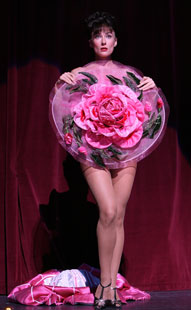 • Gypsy * (musical, PG-13, adult subject matter, reviewed here)
• Gypsy * (musical, PG-13, adult subject matter, reviewed here)
• In the Heights (musical, PG-13, some sexual content, reviewed here)
• The Little Mermaid * (musical, G, entirely suitable for children, reviewed here)
• November * (comedy, PG-13, profusely spattered with obscene language, reviewed here)
• Passing Strange (musical, PG-13, adult subject matter, reviewed here)
• Sunday in the Park with George * (musical, PG-13, too complicated for children, closes June 16, reviewed here)
OFF BROADWAY:
• Adding Machine (musical, PG-13, adult subject matter, too musically demanding for youngsters, reviewed here)
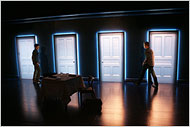 • The Four of Us (comedy, PG-13, adult subject matter, reviewed here)
• The Four of Us (comedy, PG-13, adult subject matter, reviewed here)
CLOSING NEXT WEEK ON BROADWAY:
• The Homecoming (drama, R, adult subject matter, closes Apr. 13, reviewed here)
CLOSING NEXT WEEK OFF BROADWAY:
• The Seagull (drama, PG-13, adult subject matter, closes Apr. 13, reviewed here)
CLOSING NEXT WEEK IN BALTIMORE:
• A Little Night Music (musical, PG-13, adult subject matter, closes Apr. 13, reviewed here)
CLOSING NEXT WEEK IN CAMBRIDGE, MASS.:
• The Tempest (drama, G, possible for very intelligent tweens, closes Apr. 13, reviewed here)
ON TOUR:
• Moby-Dick–Rehearsed (drama, G, not suitable for children, touring the U.S. through May 17, reviewed here)
REOPENING THIS MONTH ON BROADWAY:
• Alfred Hitchcock’s The 39 Steps * (comedy, G, suitable for bright children, reopens at the Cort Theatre on Apr. 29, reviewed here)
TT: Almanac
“Surely joy is the condition of life.”
Henry David Thoreau, “Natural History of Massachusetts”
TT: The case for lower-case opera
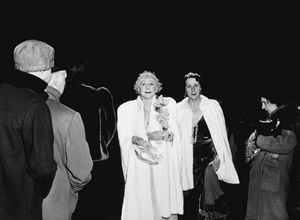 Apropos of yesterday’s posting about opera and the popular audience, a friend writes:
Apropos of yesterday’s posting about opera and the popular audience, a friend writes:
Read your post about not wanting The Letter to be Opera, but opera (if you know what I mean). Here’s the problem: the reviews won’t matter. My ex’s family is a good example: they won’t pay attention to the reviews, they won’t pay attention to ads. We took his youngest brother and sister-in-law to Carmen, another “cracking good show,” and despite enjoying it (they even knew some of the tunes), they felt so uncomfortable being at an opera they’ve never gone back.
It’s not the language problem, or the all-singing aspect (although there are those that do have a problem with that). It’s the fact that if you attend the opera, you’re somehow aligning yourself with those “snobby shiny-domes” that you don’t want to be writing yours for. Listening is one thing–but don’t actually watch (via telecast) or attend!
I know exactly what my friend is talking about. Gian Carlo Menotti’s operas played on Broadway at the height of what I call the middlebrow moment. But that age is long gone, and now it is formidably difficult to persuade ordinary people that it’s all right to like opera, or any other species of high culture–that one can enjoy Carmen and country music, literary fiction and shoot-’em-ups, abstract art and sitcoms. The problem far goes deeper than mere matters of presentation.
At the same time, though, it is essential to first get the presentation right, to avoid placing needless obstacles in the path of cultural experimentation. Greg Sandow has blogged extensively about this problem, and I agree with most of what he has to say. Very few classical-music institutions, by contrast, understand that they are now operating in a world where, as Greg puts it, “meaning…is largely expressed through popular culture.”
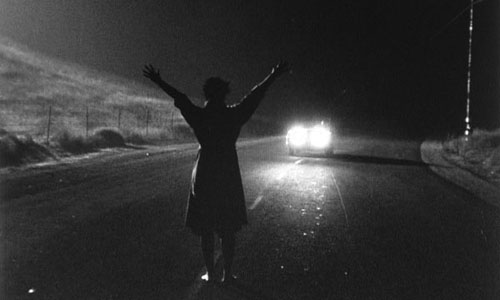 Is there a place in that world for new operas like The Letter? Possibly not. But let me quote Greg again:
Is there a place in that world for new operas like The Letter? Possibly not. But let me quote Greg again:
Years ago, when I’d defected from classical music and worked as a pop music critic, and later as music editor for Entertainment Weekly, I had a girlfriend with no high art background. But she’d often say she wanted to hear classical music. One morning, while we ate breakfast, I put on some Handel. She listened for a while, and then said, “Why isn’t classical music more noir?” Referring, of course, to film noir, the complex, dark, and morally ambiguous crime films of the 1940s and ’50s, whose aesthetic now lies near the heart of our culture, though you won’t find much of it in the classical music world. Some of it, though, did slip into classical music, and so in response to my girlfriend, I put on the suite from Berg’s opera Lulu. “You mean noir like this?” I asked. “Yes,” she said. “Like that. Why doesn’t more classical music sound like that?”
 Now let me quote from Paul Moravec, my operatic collaborator: “The Letter is an opera noir, a story of ordinary people who make a few mistakes and suddenly find themselves swept into very deep emotional water, way over their heads….We intend it to be as fast-moving and hard-hitting as a Hollywood film noir from the ’40s.”
Now let me quote from Paul Moravec, my operatic collaborator: “The Letter is an opera noir, a story of ordinary people who make a few mistakes and suddenly find themselves swept into very deep emotional water, way over their heads….We intend it to be as fast-moving and hard-hitting as a Hollywood film noir from the ’40s.”
I should add, by the way, that we’re not just saying that kind of thing in order to make The Letter sound more palatable. Right from the start of our collaboration, Paul and I were thinking in terms of noir. James Cain, Raymond Chandler, Bernard Herrmann, and Sweeney Todd figured as frequently in our early conversations about The Letter as did Tosca or The Turn of the Screw.
We know what we’re up to, and we think it will make sense to under-40 audiences. But we also know that the trick will be to get them into the theater in the first place.
* * *
This posting is by a friend who accompanied Mrs. T and me to the Actors’ Shakespeare Project’s production of The Tempest in Cambridge last month. It speaks volumes about the problem of reaching out to new audiences–and how it can be solved.
TT: Words to the wise
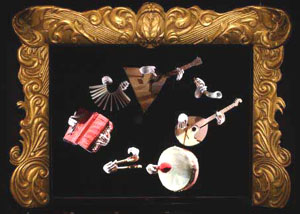 Puppeteer Basil Twist brings his production of Petrushka back to Lincoln Center tonight, where it will run through April 13. Here’s part of what I wrote about the original production in the Washington Post in 2001.
Puppeteer Basil Twist brings his production of Petrushka back to Lincoln Center tonight, where it will run through April 13. Here’s part of what I wrote about the original production in the Washington Post in 2001.
* * *
Twist is the downtown puppeteer who first attracted attention with “Symphonie Fantastique,” one of the few truly indescribable theatrical experiences I have ever seen–the closest I can come to telling you what it was like is to say that it was an abstract puppet show set in a giant tank of water through which colored ribbons and cut-outs were tugged in strange and wonderful patterns, accompanied by the music of Berlioz. I know how pretentious that must sound, but believe me, “Symphonie Fantastique” was funny and mysterious and beautiful.
So is “Petrushka,” though it’s easier to explain: Twist has taken Michel Fokine’s 1911 ballet and turned it into a miniature extravaganza, with Igor Stravinsky’s score played on two pianos by a pair of identical twins (no, I didn’t make that up). Try to imagine a cross between Jerome Robbins and Chuck Jones and you’ll get some sense of the character of this remarkable work. To call Twist a puppeteer is missing the point–he’s a master choreographer who happens to work with puppets, and he deserves a performance space of his very own.
* * *
For more information, go here.
TT: Almanac
“Hope, like faith, is nothing if it is not courageous; it is nothing if it is not ridiculous.”
Thornton Wilder, The Eighth Day
TT: Poor old media
CAAF: Afternoon coffee
• As mentioned yesterday, Ursula K Le Guin’s review of Rushdie’s latest, The Enchantress of Florence, was a ululation of praise, a hosanna of “howyoudoin'” (as they might say in the backwaters of bad Rushdie fanfic), but The Complete Review has begun rounding up critical opinion and so far the verdict’s mixed. Peter Kemp’s review is particularly scathing.
• Come play: Old Hag is hosting a contest for two books by New Yorker writer David Samuels. The challenge is to coin a word or phrase to describe when a reviewer leads off his or her review with a personal anecdote of “dubious relevance.” It’ll be tough to top “‘I’-gression” but you should try.
